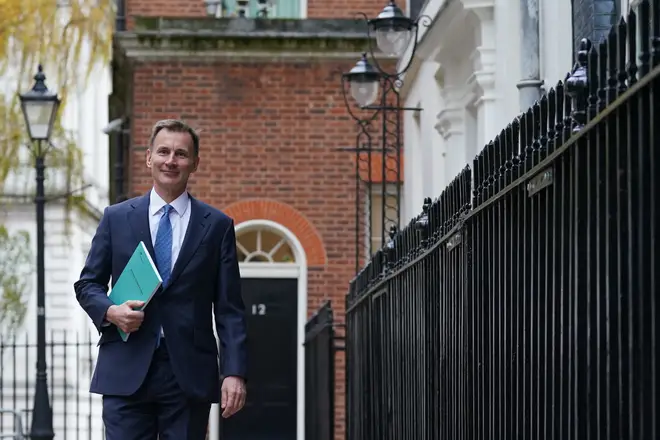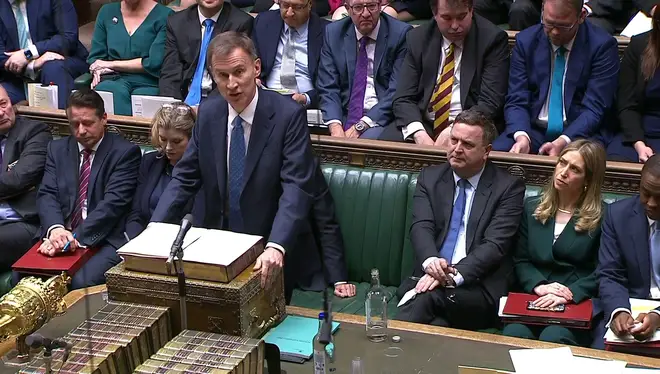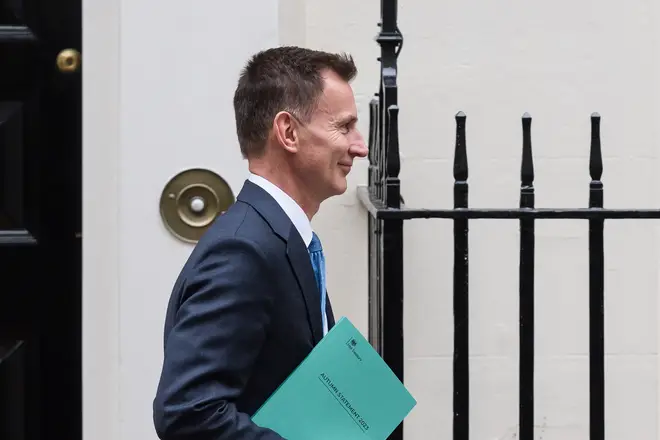
Clive Bull 1am - 4am
22 November 2023, 16:27 | Updated: 22 November 2023, 20:01

Chancellor Jeremy Hunt's Autumn Statement includes "110 measures to help grow the British economy", covering a variety of topics such as welfare and tax cuts. But what do these measures actully mean for you?
Chancellor Jeremy Hunt unveiled the measures on Wednesday as part of the Autumn Statement.
The statement covers an array of measures, including national insurance cuts, supporting British businesses and changes to welfare.
Here are the key points and highlights from the Autumn Statement:
Increased benefits: The government has now increased Universal Credit and other benefits from April 2024 by 6.7 per cent in line with September's inflation figure. This will see an average increase of $470 for 5.5 million households next year
Increased Local Housing Allowance rate: Local Housing Allowance rate will increase to the 30th percentile of local market rents. This means 1.6 million households will receive an average of £800 of support next year.
Triple lock retained for pensions: The Chancellor said that the triple lock will be retained and from April 2024, the new full station will rise by 8.5 per cent to £22.21 a week, worth up to £900 more a year.
Total commitment to easing the cost of living pressures rises to £104 billion: Included in this plan is paying half the cost of the energy bill since October 2022, which amounts to around £33,700 per household.
National Insurance relief for veterans extended for 1 year: £10 million will be provided to support the Veterans' Places, Pathways and People programme.
Productivity: Mr Hunt added that he wants public sector productivity to grow by 1 per cent a year, which included plans to cap and reduce the size of the Civil Service to pre-pandemic levels.
Read more: Rachel Reeves issues tax warning over Chancellor’s autumn statement

Mr Hunt said that the Conservative government has overseen faster economic growth than other major competitors and that the economy grew by 1.8 per cent more than pre-pandemic levels.
In relation, he cited that the Office for Budget Responsibility (OBR) forecasts a 0.6 per cent growth this year and a 0.7 per cent next year, increasing in subsequent years. He added that other countries, such as the United States, Germany, and France invest more in their private sectors, leading to higher productivity.
Boosting British business investment by £20 billion per year: This includes £50 million for apprentices in "key growth sectors"
The funding will come over the next two years to increase the number of apprentices in engineering and "other key growth sectors".
Further Natwest retail: Mr Hunt said he wants to make the UK "one of the most attractive places to start, grow and list a company.
"As part of this I will explore options for a Natwest retail share offer in the next 12 months subject to supportive market conditions and achieving value for money", he added.

Chancellor says he will 'explore options' for a potential NatWest share offer
£500 million over the next two years to make UK an AI powerhouse: Half a billion pounds will be invested to find further innovation centres to help make the UK an AI powerhouse.
£4.5 billion over 5 years for manufacturing: This includes support of £2 billion for zero emission investments in the automotive sector.
Inlcuded as well is £975 million for aerospace and £520 million for life sciences to "build on the strength of world-class British pharma companies like AstraZeneca and GSK."
£960 million for green industries: Mr Hunt said that a focus on offshore wind, electricity networks, neclear, CCUS and hydrogem will ensure the UK will remain competative in these secots where the country is a leader, and innovative in areas where it is not.
Small businesses: Any companing wanting large government contracts much show they pay their invoices within 55 days, which will decrease to 30 days.
Small business rates will also be frozen for a futher years and extent the 75 per cent business rate discount for hospitality, leisure and retail for another year.
This will save an average independent pub over £12,800 next year, which will cost of £4.3 billion.
Tax cuts: Mr Hunt has said he made the biggest business tax cut in modern British history.
National insurance: Headline rates for National Insurance will be reduced and a permanent £10 billion-a-year tax break for comapanies that invest in equipment and technology.

Self-employment: Mr Hunt has abolished Class 2 National Insurance, which is a flat rate compulsory charge, currently £3.45 a week, paid by self-employed people earning more than £12,570 which gives state pension entitlement.
This is said to save the average self-employed person £192 a year.
Self-employed people pay Class 4 National instance tax on 9 per cent of all earning between £12,560 and £50,270.
Now, Mr Hunt has cut the tax by one percentage point to 8 per cent from April.
This is said to save two million self-employed people around £350 a year.
Job seekers: If job seekers have not found a job after 18 months, a programme will require them to take part in a mandatory work placement to increase skills and improve employability.
Benefits will be cut off if recipients do not engage with job placement schemes for six months.
Living wage increase: The national living wage will increase in April 2024, to £11.44.
It is currently £10.42 for workers aged over 21 but the new figure will apply to 21 and 22-year-olds for the first time.
The national minimum wage for 18 to 20-year-olds will also increase by £1.11 to £8.60 per hour.
Apprentices will have their minimum hourly rates boosted, with an 18-year-old in an industry like construction seeing their minimum hourly pay rise by more than 20 per cent, going from £5.28 to £6.40 an hour.

Freezing alcohol duty: The government have now confirmed their Brexit pubs guarantee, meaning that duty for a pint in a pub is always lower in the shops.
Alcohol duty will now be frozen until 1 August 2024, which includes beer, cider, wine and spirits.
On the other hand, the duty for tobacco will increase by an additional 10 per cent.
Read more: Jeremy Hunt freezes alcohol duty in Autumn Statement 'to save boozers 3p a pint'
Commitment to meet NATO commitment to spend £2 of GDP on defence: Mr Hunt says this is "critical" at a time of "global threats to international order", citing the Russian-Ukraine war.
Tackling antisemitism: £7 million will be allocated for schools and universities to tackle antisemitism.
Read more: Autumn Statement: Chancellor promises to spend up to £7m on tackling anti-Semitism
Cut grid access delays and slash energy bills for people living close to pylons: Grid access will be cut by 90 per cent and offer up to £10,000 in electricity bills over the next decade for those living in new transmission infrastructure.
Planning reform: Mr Hunt said the approval system for planning applications for infrastructure projects and business "takes too long."
He assured to reform the system to allow local authorities to recover the full costs of major business planning applications" in return for being required to meet guaranteed faster timelines.
If they fail, fees will be automatically refunded.